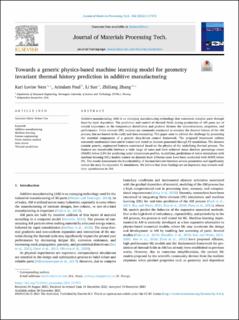| dc.contributor.author | Ness, Kari Lovise | |
| dc.contributor.author | Paul, Arindam | |
| dc.contributor.author | Sun, Li | |
| dc.contributor.author | Zhang, Zhiliang | |
| dc.date.accessioned | 2022-02-22T12:15:34Z | |
| dc.date.available | 2022-02-22T12:15:34Z | |
| dc.date.created | 2022-01-03T12:02:52Z | |
| dc.date.issued | 2022 | |
| dc.identifier.citation | Journal of Materials Processing Technology. 2022, 302, . | en_US |
| dc.identifier.issn | 0924-0136 | |
| dc.identifier.uri | https://hdl.handle.net/11250/2980767 | |
| dc.description.abstract | Additive manufacturing (AM) is an emerging manufacturing technology that constructs complex parts through layer-by-layer deposition. The prediction and control of thermal fields during production of AM parts are of crucial importance as the temperature distribution and gradient dictates the microstructures, properties, and performance. Finite element (FE) analyses are commonly conducted to simulate the thermal history of the AM process, but are known to be costly and time-consuming. This paper aims to address the challenge by presenting the essential components of a generic data-driven control framework. The proposed framework utilizes extremely randomized trees and is trained and tested on datasets generated through FE simulations. The datasets contain generic, engineered features constructed based on the physics of the underlying thermal process. The features are transferable between a wide range of cases and have achieved mean absolute percentage errors (MAPE) below 2.5% for predicting nodal temperature profiles. In addition, predictions of entire simulations with machine learning (ML) models trained on datasets from different cases have been conducted with MAPE below 5%. The results demonstrate the transferability of thermal histories between several geometries and significantly reduce the need for expensive FE simulations. We believe that these findings are an important step towards real-time optimization in AM. | en_US |
| dc.language.iso | eng | en_US |
| dc.publisher | Elsevier Science | en_US |
| dc.rights | Navngivelse 4.0 Internasjonal | * |
| dc.rights.uri | http://creativecommons.org/licenses/by/4.0/deed.no | * |
| dc.title | Towards a generic physics-based machine learning model for geometry invariant thermal history prediction in additive manufacturing | en_US |
| dc.type | Peer reviewed | en_US |
| dc.type | Journal article | en_US |
| dc.description.version | publishedVersion | en_US |
| dc.source.volume | 302 | en_US |
| dc.source.journal | Journal of Materials Processing Technology | en_US |
| dc.identifier.doi | 10.1016/j.jmatprotec.2021.117472 | |
| dc.identifier.cristin | 1973662 | |
| cristin.ispublished | true | |
| cristin.fulltext | postprint | |
| cristin.qualitycode | 2 | |

